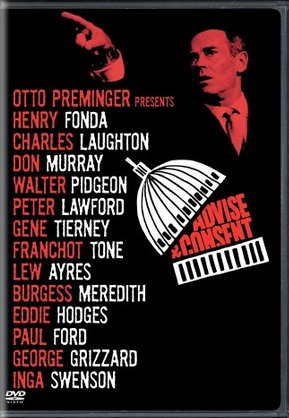High-level fictional, US national politics intrigue
based on the book by Allen Drury
 This movie, though a worthy dramatic statement, will hit you mainly on levels of culture shock. It’s about the advise and consent of the US Senate to the appointment of a Secretary of State. The candidate is played by Henry Fonda, and despite the movie jacket suggesting his pivotal role, the actual candidate in the story is truly a secondary or tertiary character.
This movie, though a worthy dramatic statement, will hit you mainly on levels of culture shock. It’s about the advise and consent of the US Senate to the appointment of a Secretary of State. The candidate is played by Henry Fonda, and despite the movie jacket suggesting his pivotal role, the actual candidate in the story is truly a secondary or tertiary character.
What I’m suggesting at the cultural level is how politics in Washington DC has changed between the early 1960s and the present day. Most striking to me is the relative power US senators carry between then and now. And I can express that difference in a single opening sequence of scenes: the majority leader of the Senate takes a taxi (hailed by the doorman) from his apartment complex to get to his office near the Capitol… and then rides to the chambers on what look like old Cushman electric golf carts.
They may still have some sort of shuttle carts, but I bet they sure don’t look like something a coolie would haul around town.
From our perspective today, these men—by the way, there is one woman senator, played by Betty White, and she even has a couple of pivotal lines—look more like struggling small town businessmen than megapowerful officeholders who decide the fate of nations while throwing their weight around in Roman sartorial splendor, with a fleet of aides and Lear Jets, hobnobbing with celebrities, and eagerly anticipating their next Occult man-boy bonding ceremony at Bohemian Grove.
Of course, the technology, too, is quaint. Telephones with live (women) employees who answer them for you, Rolodexes, small-screen TVs without remotes, and rooms and buildings that look like, well, something out of the early ’60s. [Interestingly, Advise and Consent was released June 6, 1962, just a few months before the Cuban Missile Crisis under President John F. Kennedy. Just bringing this up for historical context. Compared to what was really going on, the nomination of an SOS candidate seems pretty tame, indeed.]
And it is tame. After a fashion. The candidate is considered a peacenik, in those days, that was code for Communist or Red, left-wing socialist, big welfare-state liberal, etc. But mainly the charge was that you weren’t a real man if you didn’t want to stand toe to toe (with nuclear weapons) with the (contrived) enemy du jour, the Russians. The confirmation poses a problem, thus, for the men surrounding the president (i.e. the majority leader and others who prefer a well-oiled machine) … and because… well, you’ll find out. But the president’s health is an issue and he seems to have made the nomination without considering the fallout.
The upshot is dirty tricks are threatened, then a couple of them are played on both sides. The young good-looking senator, Brigham Anderson (Don Murray), is tagged by the majority leader (Walter Pidgeon) to chair a subcommittee to validate the nominee. Which he does with aplomb. Only, Anderson chooses eventually to go against the President and some in his own majority party vis a vis recommending the nominee out to the Senate. At this point, the plot really thickens with a serious threat to expose something from the young senator’s past. Murray does a terrific acting job.
Beyond that, well, I remember liking the book a lot more than the movie. I was into Ayn Rand in those days, and she was quite the fan of Allen Drury. The writing was crisp and kept me reading, wanting to know what would unfold next. The relationships were drawn intelligently with humor, and I walked away with what I now recognize as an overly generous conclusion that ‘our American system works,‘ though sometimes the rough and tumble is quite awful.
Let me say something about how American culture dealt with the issue of homosexuality in the early ’60s. These were my impressionable 10-13-years-old days, and men were men. Butch haircuts reigned supreme, my dad had one. I recall vividly when I asserted to him at the outset of Beatlemania (~1964) that I wanted to let my hair grow like theirs, he said, “If you do that, I’m going shave it off. Dammit. If I have to get Joe Cates (we knew from the church) to help me, you are not going to wear your hair like a girl.” I’m not sure that’s homophobia or misogyny, but I didn’t press it. I also remember that one of our junior high teachers was effeminate, and he was eyed warily by just about every man in the town as a pedophile.
So was there a stigma in those days about gays?
Is the pope a Catholic?
Just saying, because it helps to understand some of the behavior in the movie. It also rounds out understanding. We can talk about the ’50s and the ’60s as the good old days, and it was 100% more honest and real than today—TV was in its infancy and every flicker of the tube into your brain hadn’t yet been programmed and commercialized—but the pressure to conform was immense. Further, deviations were not simply stigmatized, they were often ILLEGAL. Homosexual relations were banned in most states… along with sex before marriage. Nor had ‘the pill’ come along: unwed pregnant girls were outcasts. Some great sadness and oppression here in the ol’ US of A.
Really, a bittersweet experience to watch this movie today.
This post has been read 3809 times!

